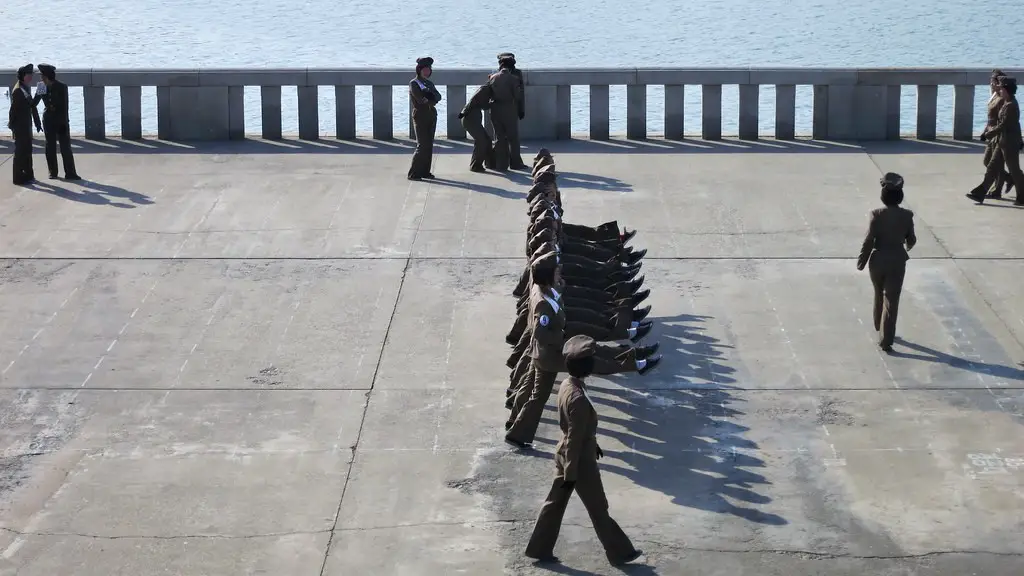The Call to Action
North Korea’s nuclear program is of great international concern. In recent years, there has been a heightened attention to the situation, given the nation’s provocative initiatives and belligerent behaviour. In response to this development, the United Nations has launched various attempts to bring the Hermit Kingdom to the negotiating table and to halt or reverse its nuclear arms program.
The country’s secretive government hides its nuclear plans from public scrutiny. Nevertheless, satellite evidence and intelligence reports suggest that North Korea is actively developing more advanced and powerful technology. In late 2017, the Academy of Science declared that North Korea had successfully tested a hydrogen bomb; if confirmed, this would represent a dramatic shift in the nation’s weapons capabilities.
The financial cost of developing and maintaining a nuclear arsenal can be immense. Reports suggest that the nation has invested heavily in their nuclear program over the decades, using funds that could be used to provide basic services such as food, housing or healthcare to its people. It is unclear that spending on such defence initiatives is truly beneficial to the nation or its citizens.
With regards to the role of the United States, diplomats and experts have long speculated whether or not economic sanctions will deter the North Korean government from developing its nuclear program. The US has engaged in high-level negotiations with the North Koreans in the past, but the nation has so far refused to budge on these issues.
The big question on everyone’s minds is: will North Korea continue to strengthen its nuclear arsenal and build up a powerful nuclear force? Or, will the global community be able to negotiate a peaceful resolution and disarm the nation?
The Economic Cost
North Korea’s nuclear program has severely impacted its regional relations and its economy. International sanctions have crippled the nation’s access to markets abroad, and trade restrictions have made it increasingly difficult to obtain the resources necessary to fund their nuclear development.
The country’s economy is in a fragile state, with reports suggesting rampant government corruption and an overall lack of investment in infrastructure and healthcare. On top of this, UN reports indicate that the nation is dealing with an acute malnutrition and hunger crisis, in addition to endemic human rights abuses.
This has naturally had a detrimental effect on the lives of everyday North Koreans. While the nation’s military-industrial complex has benefitted from the nuclear program as a whole, marginalized groups – including women, children and the elderly – have born the brunt of the financial burdens.
Experts have suggested that, while it is essential to prevent North Korea from acquiring nuclear arms, the international community needs to focus on providing humanitarian and economic aid to the North Korean people. This requires more than simply imposing more sanctions on the Kim Jong-un regime; it means engaging in meaningful dialogue and cooperation with the nation on a wide range of issues.
The Strategic Motivation
The strategic motivations behind North Korea’s nuclear program remain an open question. Some analysts suggest that by acquiring nuclear weapons, North Korea hopes to gain a more powerful voice in the international community, a move which would give the nation greater power and security.
The strategy makes sense when viewed through the lens of history. North Korea’s predecessors – the Soviet Union and China – both used nuclear arms as a way to successfully challenge the American-dominated global political order. Although the Kim Jong-un regime has not explicitly articulated this goal, nuclear proliferation can be seen as one way of pursuing a degree of autonomy from global powers.
Meanwhile, other experts argue that North Korea is simply in the business of creating a nuclear deterrent. In this sense, having a nuclear arsenal could dissuade other nations from attacking North Korea and violating its sovereignty. This could be the reason why other regional powers, such as China and Russia, have continually voiced their opposition to the US-led campaign of economic sanctions against the reclusive nation.
International Reactions
North Korea’s nuclear program has naturally led to an international outcry. US President Donald Trump’s efforts to isolate North Korea have only increased tension in the region and have encouraged further bellicose rhetoric.
At the same time, other nations have sought to engage with the Hermit Kingdom in a more diplomatic role. In 2017, South Korean President Moon Jae-in proposed direct negations with North Korean leaders, an initiative which was ultimately supported by China and Russia. That said, these talks have so far yielded very little in terms of progress for the peninsula.
From the perspective of the United Nations, the development of North Korean nuclear weapons is a violation of international law. UN Security Council resolutions have attempted to contain the proliferation of nuclear arms, but due to the complexities of the situation and the stark divisions between different international players, progress has been slow.
The Future Direction
The future of North Korea’s nuclear program is uncertain. Many analysts have argued that the only way to halt the proliferation of nuclear weapons is through direct negotiations and diplomacy. Others worry, however, that this may be too late and North Korea may already have a nuclear arsenal that is irreversible, which may have catastrophic consequences for the region and beyond.
From the US perspective, tensions between the two sides are of paramount importance. In 2017, the US accepted the invitation to meet with North Korean negotiators, an unprecedented move that opened the door for further dialogue. But whether the American-led sanctions will truly stifle North Korea’s ambitions, or prompt it to become even harder in its stance, remain unanswered questions.
In recent months, North Korea’s government has held talks with South Korea and the US, taking both sides by surprise. Despite these initial dialogues, however, North Korea has shown no sign that it is willing to abandon its nuclear program.
The Arms Race and Assertive Posturing
The international community’s response to North Korea’s nuclear program has largely been one of containment. Military and economic strategies have sought to pressure the regime, but often the lack of a clear and decisive strategy has fanned fears of a regional arms race.
The development of nuclear weapons has sent a strong message to neighbouring countries. After all, if South Korea and Japan develop nuclear arsenals of their own, the entire region could be at risk of a devastating conflict. In this sense, North Korea’s nuclear program must be seen as a signal to the international community of its determination to hold its own against powerful adversaries.
Likewise, North Korea is attempting to use its nuclear prowess as leverage in foreign policy discussions. While the exact details of their negotiating strategies remain unknown, it is clear that the regime is attempting to take a hard stance on any attempts to restrain their nuclear ambitions.
The Potential Impact on the Region and Beyond
The potential implications of North Korea’s nuclear program are immense. Whether the regime acquires an arsenal of nuclear weapons or not, the situation is deeply troubling. The Hermit Kingdom’s relentless pursuit of advanced arms technology is unacceptable and must be addressed; a failure to do so could have disastrous repercussions.
From a regional standpoint, North Korea’s actions have already inflicted considerable damage on the political and economic fabric of South Korea and Japan. Moreover, the US-led sanctions have caused immense economic hardship for the people of North Korea.
One thing is certain: the emergence of a nuclear-armed North Korea would modify the balance of power in East Asia and introduce further instability into the region. The international community must work together to find a peaceful resolution to the crisis, one that offers lasting and meaningful security for the Korean peninsula and beyond.

